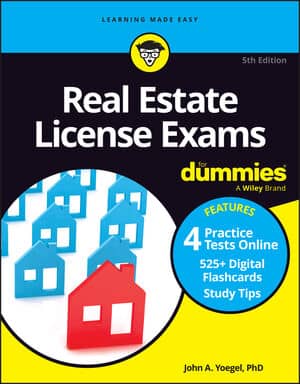Discriminatory advertising is prohibited. The Real Estate License Exam will expect you to be able to apply this rule. Although discriminatory advertising is easy to understand, it may be a little confusing to apply. The obvious and outright discriminatory advertisement is, for example, “Apartment for rent, Latinos not welcome.”
Suppose, however, that you place an ad in a suburban newspaper for a new housing subdivision that includes a picture of several White families sitting around the backyard barbecue.
Such an ad also is considered discriminatory, because the ad can be viewed as welcoming only White people to the development. The reverse also would likely be considered discriminatory. For example, an ad showing only Latinos in the backyard might be viewed as an attempt to steer that ethnic group to that neighborhood.
HUD issued guidelines that must be followed in real estate advertising. These guidelines cover primary areas of possible discrimination:
Advertising that uses certain words, phrases, pictures, or other visual representations that are discriminatory.
Using certain types of media as a means of discrimination. For example, advertising in media only available to or likely to be seen by targeted groups (protected classes) or in reverse not seen by those groups such as a local newspaper that is read by a White ethnic group.
HUD provides fairly specific information about what language is and is not acceptable in real estate advertising. For exam purposes and for real-world applications, remember that the use of certain words or phrases is prohibited even when your intent is not to discriminate. The categories of the prohibited language with some examples include:
Code words, catchwords, or catchphrases: These prohibited words may be a little more subtle or regional in nature. Obvious phrases like “integrated neighborhood” cannot be used. Words like “exclusive,” although more subtle, may convey a racially exclusive or ethnically exclusive message and therefore are to be avoided.
Color: No use of words describing color as it relates to race or ethnicity is permitted. For example, “White” or “Black.”
Familial status: The term “familial status” generally refers to the presence or absence of children in the family. Although marital status is not a protected federal class, HUD guidelines prohibit advertising that states or implies “married couple only” or other similar language.
Handicap: “Property not suitable for a handicapped person” or any language that suggests an exclusion like that is forbidden. Inclusive words like “Apartment is handicapped accessible” are acceptable.
National origin: The use of words that describe national origin like Italian, Mexican, and so on are prohibited.
Race: No use of racially descriptive words, such as Asian or Caucasian, for example, is permitted.
Religion: Words describing religions, like Catholic, Christian, non-Christian, and so on, is prohibited.
Sex or gender: This category tends to be a problem more with rental housing. Gender-preference words are prohibited. Exceptions are made for people who want to share an apartment or house with a roommate of the same sex. So you can advertise for a female roommate to share an apartment, but you can’t advertise for only a male tenant for a rental apartment in an apartment house you own.
In addition any photos, drawings, or symbols that may imply preference with respect to any of the above categories are prohibited — for example, showing a picture of a church next to the house you’re advertising for sale. Describing the location by using potentially biased references, such as “near the Catholic church,” is prohibited.
A reference to a known discriminatory facility must also be avoided. So you won’t advertise a house for sale “near the XYZ Country Club” when the country club is known to discriminate in its membership policies.
Prohibited language, photos, symbols and so on are considered discriminatory at their face value, or as they appear, meaning that good intentions don’t count. Furthermore, discriminatory language can’t be used to describe a tenant or buyer preference, the neighborhood, or the dwelling itself. So “Good Christian building” is just as bad and just as prohibited as “Apartment for rent: Only Christians need apply.”
Avoid using welcoming and inclusive terms, such as advertising that states specific groups are welcome. The use of the HUD fair housing logo and words to the effect that fair housing guidelines apply are the proper ways to say that all groups are welcome to buy or rent.
One other factor that HUD addresses in its guidelines is the use of terms that have lost their original religious or exclusionary meaning. For example, an ad placed during December that reads “Give yourself a Christmas present with a new house” would not be prohibited.

